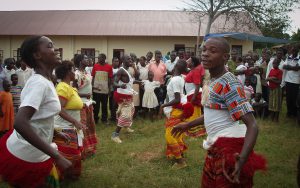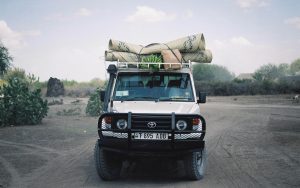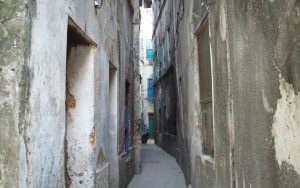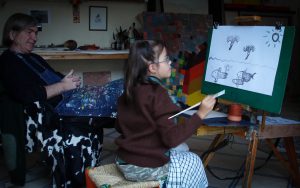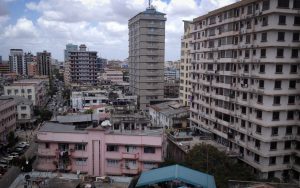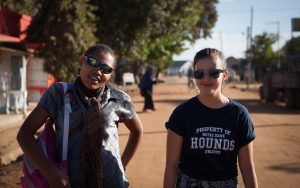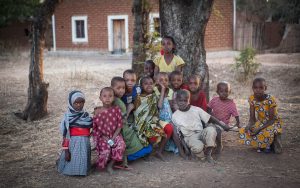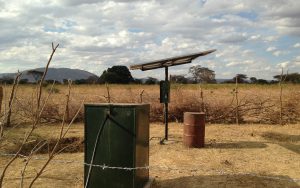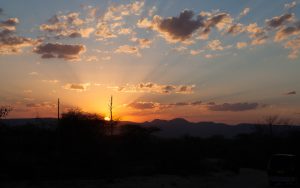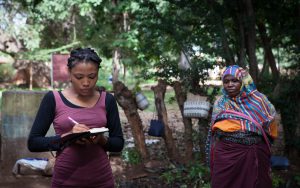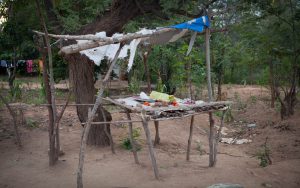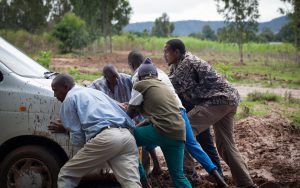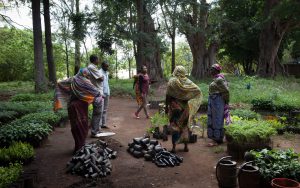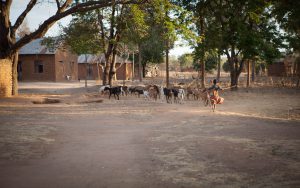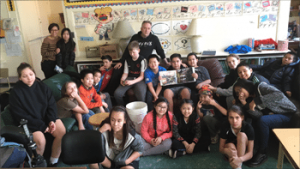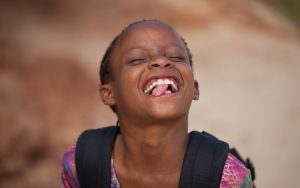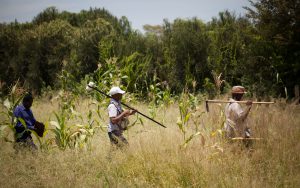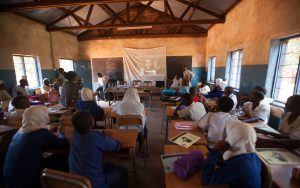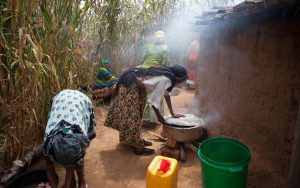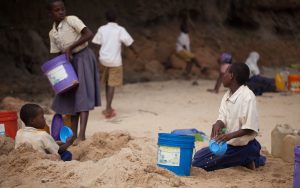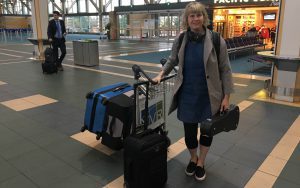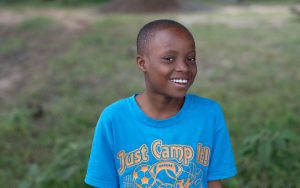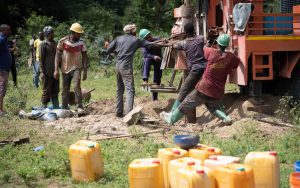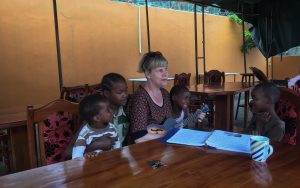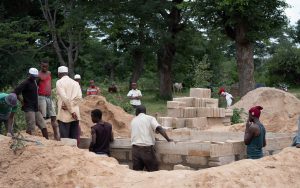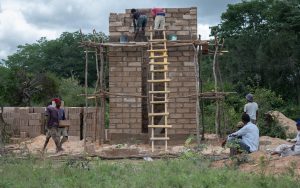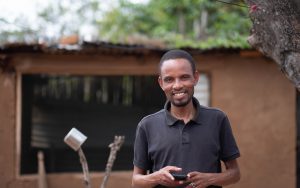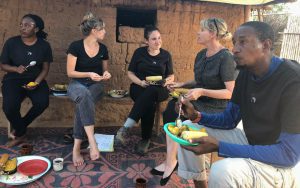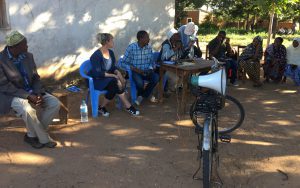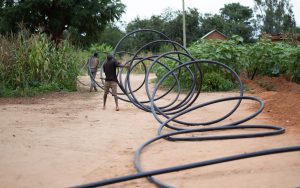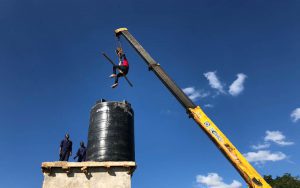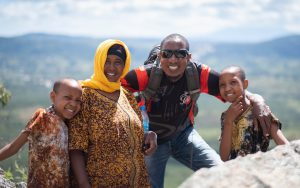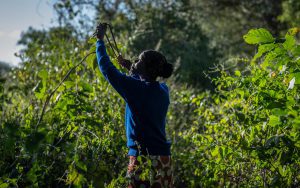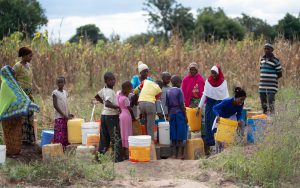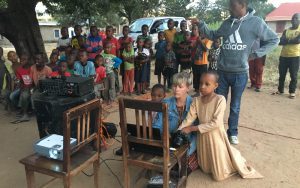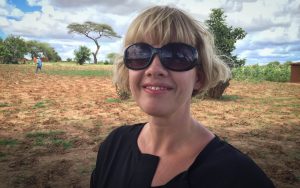You know that feeling when you wake up a little confused and don’t quite know where you are, and then you shake it off and everything is super normal again?
The dirt roads outside of the Kondoa Climax Annex Hotel and the call to prayer were anything but normal. Outside, women in colorful dresses—a few with water buckets on their heads—were walking down the dirt roads, and that dream state felt all the more real.
The annex hotel was similar to the hotel from the last trip and was technically part of the same complex. In fact, the same guy owned both. It had a few colourful rooms that encircled an area with tables and chairs that were great for sitting and working. Aisha was still there, but the rest of the staff had changed. Amina and Oliva were sorely missed, but the new girls were just as youthful, fun, and energetic.
Jet lag was still weighing on me, but that was nothing a little coffee couldn’t fix.
Moshi came by the hotel, and as we sat drinking coffee, a young ten-year-old girl came up and started asking questions in nearly perfect English. The bumpy ride to Kondoa town had taken seven hours, so in my tired state, my patience had worn thin, and I wanted to ignore her, but she persisted. Sometimes, it’s easier to not to trust someone who may just turn out to be a grifter, however old they are, but she was a lovely and smart girl who just wanted to talk. Her name was Baraka.
We spent the next few hours chatting, and I asked her to help with my Swahili. I told Baraka that when speaking Swahili, my brain was like a little baby (watoto), so she corrected all my mistakes, and she knew any word that eluded me.
Baraka lived with her grandmother around the corner from the hotel, so we walked her home with the intention to ask that she be allowed to come with us to Iyoli as a translator. Baraka’s mother worked in Arusha as a nurse and happened to be home for the weekend, but unfortunately her father had died earlier in the year. We were invited into their cement house and sat on the couch along the wall. We talked about the project and showed them the book from Strathcona, as well as the song and the videos. Everyone agreed that it would be a good learning opportunity for Baraka to come, but only if her teachers gave her permission to leave school. It was also nice having another female around to balance out all the men that this project would undoubtedly involve.
After leaving Baraka’s home, we went to the market to buy coffee beans. Tanzania is one of the best producers of coffee in the world—some of it’s even grown in Iyoli, but hotels all serve Nescafe instant coffee. I had been trying to explain that Nescafe is terrible and that people are willing to pay premium prices for a Tanzanian roast in Vancouver.
When I returned to the hotel, the girls agreed to roast and grind the coffee beans. When they brought me a cup of freshly brewed coffee, it was more of a meal than a drink with all the chewing involved, but rather than figuring out how to ask for a strainer, or insulting them by not drinking it at all, I just smiled and took big gulps.
Baraka, who was Muslim, attended a private catholic school with assistantance from a donor in Texas, and we stopped there before heading to Iyoli the next day. The school provided one of the best educations in the region, which is why she knew how to speak English so well. Much like other parts of Tanzania, proceedings at the school were quite formal, and obtaining permission took a while. We greeted the headmaster, signed in, and told her about the Iyoli Water Project. She then brought us to Baraka’s teacher and we explained our project. Again.
The teacher raved about Baraka’s marks and showed off all of her work. We spent over an hour at the school before they released her from class with a week’s worth of homework in tow.
We arrived in Iyoli late in the afternoon with Moshi, Baraka, and Issa the driver. The purpose of our visit was to prepare the villagers for the water survey that was going to take place and talk about the school exchange. Moshi had been back and forth to the village a few times over the last two months, but it was good for the villagers to see me accompanying him this time. Village politics were tough to understand, but suffice it to say, it all boiled down to gossip and mutterings. For all they knew, the project wasn’t real, but having me there helped to make it a reality for the villagers.
We were greeted by the village chairman, but there were only men at the meeting spot. Moshi was upset and had a long talk with the chairman, and then he stood up and spoke very loudly to the men. Baraka interpreted by saying, “Moshi is very mad that the woman are not here and he won’t start the meeting until they come since they are the ones that collect the water.” Then she turned to me and said, “Moshi is very brave”—commentary that only a child would make. I was nervous and uncomfortable, but fifteen minutes later, the women started to arrive, and the meeting began.
I didn’t understand all of what Moshi was saying (my lovely interpreter got distracted drawing pictures of the trees and colouring her fingernails), but he brought people together and made them laugh. He said that we must all work together, and I could feel a sense of peacefulness in the faces of the villagers. Moshi may have called out the chief, but they talked as friends afterwards. By the time we left, it was already dark, but people were happy, and we had accomplished what we had set out to do.


